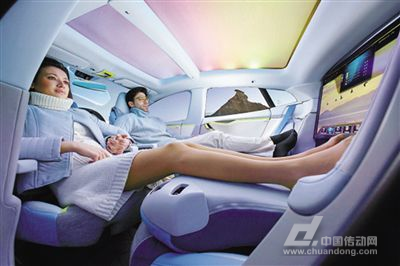With the rapid advancement of the internet and artificial intelligence, cars are no longer just vehicles—they are becoming large-scale mobile terminals. Technologies like automatic braking, remote control, and autonomous driving are paving the way for intelligent, network-connected vehicles to become a reality in our daily lives.
At the China (Wuhan) International New Energy and Intelligent Vehicles Development and Cooperation Summit, held on the 12th, experts from top institutions such as the State Council's Development Research Center, Tongji University, Beijing Automotive Group, and Sichuan University expressed optimism about the future of smart and driverless vehicles. Many believe that the widespread adoption of these technologies could spark a trillion-dollar market.

**Revealing the "Explosive Technology" of Tomorrow**
Rong Hui, Vice President of the Beijing New Automobile Research Institute, emphasized that "driverless driving will be an 'explosive technology'." In his speech titled “Driving Without Drivers and the Future,†he highlighted how autonomous vehicles will reshape the relationship between people and cars, making car-sharing a common trend.
He pointed out that many individuals only use their cars for two hours a day, leaving the rest of the time idle—a major waste of resources. With the rise of driverless cars, people may not even need a license to use them. This shift could reduce the number of personal cars by up to a quarter in the future, similar to how shared bikes have impacted traditional bike manufacturers.
Zhu Xi, a professor at Tongji University’s School of Automotive Engineering, noted that over 1.25 million people die in traffic accidents annually, often due to human error. He explained that the combination of electric vehicles and smart networking will make cars more crash-resistant, shifting safety from passive to active, with electronic drivers replacing human ones, significantly reducing accident rates.
Experts predict that the adoption of smart and autonomous driving will bring not just changes in driving habits but also revolutionary shifts in vehicle design, production, and business models. For instance, driverless cars might lack steering wheels and offer flexible seating arrangements, transforming into mobile offices or lounges.
**The Rise of Intelligent Networked Vehicles**
Intelligent networked vehicles are equipped with advanced sensors and modern communication systems, enabling seamless interaction between vehicles, people, roads, and back offices. These vehicles feature complex environmental awareness, intelligent decision-making, and collaborative control—marking a new era in automotive technology.
China has elevated the development of intelligent networked vehicles to a national strategy, setting clear timelines and roadmaps. The “Made in China 2025†initiative aims to master key technologies by 2025, while the “13th Five-Year Plan†for the auto industry promotes the adoption of intelligent connected vehicles, aiming for 50% of new cars to have level 1 automation and 10% to reach level 2 automation.
Major automakers and tech companies are investing heavily in this field. Companies like FAW, Changan, and Geely have been researching related technologies for years. At recent auto shows, brands like FAW-Volkswagen have introduced models with smart driving features such as voice interaction and app-based controls.
Dongfeng Motor, one of China’s four major auto companies, has been developing autonomous driving since 2013. It now offers features like one-key parking, multi-vehicle formation, and remote control in several models. By 2020, it plans to implement conditional autonomy, and by 2025, it aims for “emotional driving.â€
Tech giants like Baidu, Alibaba, and Tencent are also entering the scene, working on high-precision maps and smart car solutions. Baidu’s CarNet allows drivers to plan routes and access lifestyle services through its LBS platform. Alibaba has partnered with SAIC to develop smart vehicles.
In a recent collaboration, Dongfeng signed a deal with JD.com to develop unmanned delivery trucks, combining JD’s AI and logistics expertise with Dongfeng’s hardware and driverless solutions.
**Driverless Driving: A Vision for the Future**
Imagine a scenario where a man uses his phone to summon a driverless mini-vehicle that picks him up and takes him directly to his destination. Such scenes are already being tested in real-world environments.
At the summit, Dr. Qiu Jun from Beijing Science and Technology Co., Ltd. showcased a video of the company’s first pilot project at Guangzhou Baiyun Airport. Earlier this year, SSC launched the first normal operation of unmanned vehicles in Hangzhou’s Raffles City, equipped with advanced sensors and cameras.
Qiu Xin, who leads the company, believes that while the technology is still in its early stages, the focus should be on low-speed logistics and shuttle services before full autonomy becomes feasible. He estimates that within 10 years, China’s driverless industry could see significant growth, though full-scale deployment will take time.
According to Galaxy Securities, the intelligent networked vehicle industry holds great potential, with opportunities in areas like sensors, mapping, and assisted driving systems. As smart technology spreads across all levels of the automotive market, the sensor industry alone is expected to grow rapidly.
In the coming years, intelligent networked vehicles could unlock a trillion-dollar market, reshaping transportation, commerce, and daily life in ways we can only begin to imagine.
Music Greeting cards
Musical Greeting Cards, Recordable Greeting Cards, Musical Birthday Cards
AST Industry Co.,LTD , https://www.astsoundchip.com




